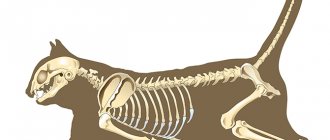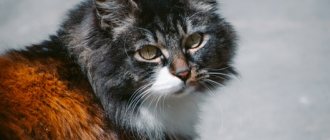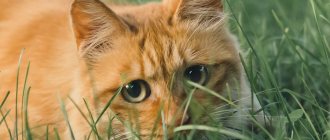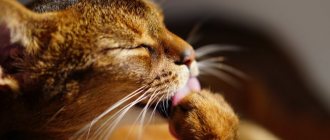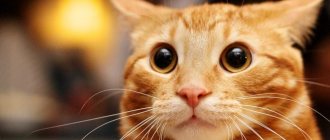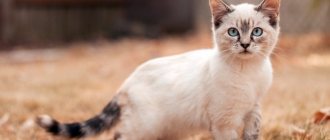All animals, falling asleep, relax and begin to make various sounds. Therefore, it is not surprising that a cat snores in its sleep. The main thing is to determine whether it is snoring. Such sounds can be a kind of purring or loud snoring. If it really is snoring, then you need to find the cause of its occurrence. It can appear due to the development of pathologies or pronounced characteristics of the cat’s breed.
Breeds that are inherently predisposed to snoring
You need to understand that representatives of some cat breeds are considered avid “snoreers”, and in their case, snoring is normal (in most cases), and there is no need to worry when it appears. These include:
- Persian cats.
- British.
- Scottish lop-eared.
- Himalayan cats.
- All crossbred animals whose ancestors include the above breeds.
Snoring is associated with brachycephaly. Pets have a flat muzzle, the volume of the respiratory tract and nasal cavity is small, which is why various wheezing and whistling sounds may occur when breathing. But! The problem can be much more serious, and in some cases, “cute snoring” is a harbinger of expensive and unsafe treatment. Moreover, its absence can be fraught with death or a significant reduction in the life of the pet.
Important! Snoring itself is not a normal phenomenon for cats, and we would strongly advise you to immediately determine its specific cause!
Why does a cat snore and wheeze in his sleep?
Cats are known to spend most of their lives sleeping. To be precise, cats sleep 12-14 hours every day, and sometimes this figure can reach 16 hours. This is not so noticeable to people, since pets sleep in short periods of time, and not in a continuous interval of 14-16 hours. And sometimes such a dream is also accompanied by snoring.
Of course, when we accidentally find videos of snoring dogs and cats on the Internet, we watch them with joy and are touched, but when we ourselves encounter a similar problem, it becomes alarming and unnerving. Especially if your pet starts snoring at night when everyone is sleeping.
But what makes cats snore like people, why do cats snore in their sleep? The main cause may be a blocked airway. Often, cats' breathing becomes difficult due to the presence of fluid in the nasopharynx. The liquid that fills the animal's nasopharynx is usually snot.
Causes of snoring in brachycephalic cats
Since this phenomenon is well-known, veterinarians have already accumulated statistics on the most common pathologies.
Nostril stenosis in brachycephalic cats
In Russian-language veterinary literature, this phenomenon is almost not considered, but practicing specialists are confident that its importance is clearly underestimated. In this case, stenosis implies thickening of the tissues lining the inside of the nasal cavity.
The causes of stenosis vary, with many experts suggesting that brachycephalics have a genetic predisposition. Chronic inflammatory diseases of the respiratory system, the effects of irritating and toxic substances, allergies, etc. play a major role.
In severe cases, stenosis leads not only to relatively harmless snoring, but also to serious respiratory failure. This, in turn, is fraught with deterioration in oxygenation of tissues throughout the body, which will inevitably lead to the development of other pathologies.
Lengthening the soft palate
Another pathology characteristic of cats with a flattened muzzle. The supposed reason for the development is the genetic predisposition of the breeds described above. As the name suggests, in this case the tissues of the soft palate lengthen and sag, blocking the respiratory lumen.
During wakefulness, when tissue tone is relatively high, no symptoms may appear. But during sleep, when the pet’s body is completely relaxed, the soft palate sags greatly and “falls” into the lumen of the respiratory organs. This causes snoring and severe breathing problems. Sick cats sleep poorly, wake up abruptly, and this process is accompanied by wheezing, loud meowing and other “special effects.”
Internal laryngocele
A pathology characteristic only of Persian and Himalayan cats. It is extremely rare in representatives of other breeds. With this disease, swelling and growth of false vocal folds are noted.
One of the characteristic signs is the same snoring. Also, sick cats are distinguished by a strange hoarse meow, and during “conversations” the pets often cough and wheeze. In extremely rare cases, laryngoceles can grow through the soft tissues of the neck (i.e., external laryngoceles appear). In this case, they are easily distinguishable as swelling under the skin.
Preventive actions
To prevent the listed diseases, one of the symptoms of which is sniffling and grunting in a pet, the following safety measures must be observed:
- Carry out vaccinations and deworming in a timely manner. Such measures will help avoid the development of infectious diseases and the appearance of parasites.
- If your pet has an allergy, eliminate its sources in the apartment and avoid the cat’s contact with allergens outside the home.
- Avoid overeating. Do not leave uneaten food in the bowl. If you gain excess weight, it is recommended to switch your pet to a low-calorie diet. Sterilized cats and neutered cats must be fed special food.
- Avoid hypothermia and overheating of the pet and drafts.
- Increase the animal’s immunity through the regular use of vitamin and mineral complexes, agreed with the veterinarian.
- Conduct regular preventive veterinary examinations to promptly identify existing diseases.
- Start eliminating signs of pathologies immediately after they are identified.
Treatment of stenosis and concomitant diseases in cats of brachycephalic breeds
First, the veterinarian must decide how much treatment is necessary in this case. If the animal feels normal, and its night snoring does not wake up the neighbors up to the first floor, its health is probably not in danger. Objective reasons for starting therapy are the following:
- The pet sleeps very poorly and constantly wakes up at night.
- If you look closely at a cat during sleep, you can clearly notice the moments when its breathing completely stops.
- In severe cases, the animal begins to snore and wheeze, regardless of the time of day.
- The pet stops playing, finds it difficult to play any active games, and develops shortness of breath.
- The cat weakens, exhaustion develops, the animal is constantly nervous and irritated (due to lack of proper sleep).
Treatment of all the above pathologies is exclusively surgical. In some cases, the matter is limited to excision of excessively overgrown tissue; in the most severe situations, they are replaced with implants. In addition, the pet is prescribed antibiotics and anti-inflammatory corticosteroids to prevent the development of post-operative infections and inflammatory processes.
If the animal is elderly and there is a risk that it will not survive a serious operation, auxiliary therapy is practiced. In this case, the cat is prescribed drugs to maintain the cardiovascular and respiratory systems (aminophylline, caffeine compounds). They help maintain a fairly high standard of living for the pet.
What to do if the problem is chronic
It’s great when you can cure a runny nose and get rid of creepy sounds at night forever. But sometimes eliminating the cause is delayed or completely impossible. This does not mean that nothing needs to be done.
Regardless of why your cat snores, there are several ways you can improve the situation yourself:
- avoid feeding before bedtime;
- a protein diet with minimal fat helps to lose excess weight;
- controlled physical activity keeps muscles toned, but overwork should not be allowed;
- a household humidifier is useful for the whole family, but especially for snorers - it helps combat drying out of the mucous membranes;
- a comfortable orthopedic or anatomical mattress prevents the head from sinking, supporting the neck and sternum. A large square pillow for people or a special dog mattress will do.
Happy are the owners who don’t know if their cats snore; the rest have to put up with loud noises that disturb their sleep. But breathing difficulties bring much more problems to your pet. Snoring is oxygen starvation, which affects the entire body. It is unwise to get used to such a serious problem when it can be solved together with a doctor.
Possible causes of snoring in cats of other breeds, treatment
Of course, the number of snorers is not limited to brachycephalic breeds. Other pets can also snore (albeit less likely). In their case, the causes of snoring are approximately the same, but they also have their own characteristics:
- Individual characteristics of the animal. It happens that even completely healthy animals snore. We note, however, that in such cases the snoring is quiet and does not cause absolutely any inconvenience to either the owners or the animal itself. Most often, “individual characteristics” refer to congenital defects and deficiencies in the structure of the nasal cavity. Again, this is very relevant in the case of crossbred animals.
- A common cause of snoring (and this applies to all breeds) is obesity. This is largely due to the fact that too “chubby” pets often develop diseases of the cardiovascular system.
- The pathologies of the cardiovascular system themselves. In severe cases, snoring may not be snoring, but a sign of incipient pulmonary edema. True, the pet does not snore, but wheezes while already conscious. Panic attacks and inappropriate behavior are possible.
- In rare cases, the cause of snoring may be hydrothorax, or hydrops of the chest cavity. In this case, pleural effusion compresses the lungs and interferes with normal breathing, which manifests itself in the form of snoring.
- Snoring can be a consequence of a head injury or severe inflammatory disease. Often, a 100% cure does not occur; scars, thickenings and other neoplasms remain on the tissues of the nasal cavity, interfering with the normal passage of air.
- Unfortunately, snoring can be caused by tumors both in the nasal cavity and in other organs of the respiratory system. However, they do not necessarily need to be malignant: benign neoplasms also interfere with the normal passage of air.
Why does the British cat snore?
If you have a “British” living at home and you are faced with the problem of his snoring, you shouldn’t worry too much. This breed also occasionally has a runny nose, and occasional snoring is not a global problem. However, if you notice that your cat's snoring is beginning to become systematic, you need to think about it. And the best decision in this situation would be to refuse to independently search for the causes and solutions to the problem, as well as immediately contact a veterinarian.
Only experienced specialists are able to quickly diagnose, take all the necessary tests, and say exactly what the cause of a cat’s snoring is. After this, if any pathologies are detected, the doctor will immediately prescribe appropriate medications for further treatment.
When is urgent veterinary intervention necessary?
Signs that indicate you need to see a doctor immediately
:
- The animal suffocates while sleeping.
- Dry and hot nose, apathy, the cat does not eat well, is apathetic, diarrhea, vomiting.
- The cat sneezes and coughs all the time.
- There is mucus or fluid coming out of your cat's nose.
- The voice became hoarse, low or, on the contrary, too high.
- Swelling appeared on the face, especially near the nose.
- The cat tries to breathe through its mouth, stretches its neck as if something is bothering it.
Brachycephalic syndrome
Severe snoring (glanders) and a number of accompanying pathological features that seriously impede breathing are called brachycephalic syndrome. This syndrome is typical for cats with small noses and round heads: Persians, Exotics, British and Scottish.
Brachycephalic syndrome can be eliminated surgically, which, however, is not always considered justified. However, there are such manifestations when, due to this syndrome, the cat has cyanosis of the mucous membranes, the airways swell, the load on the heart increases, and after the slightest overheating or physical activity, convulsions develop or the cat loses consciousness. This condition significantly impairs the quality of life and can be fatal, and therefore requires treatment. Read more about brachycephalic syndrome.
EXPERT COMMENT: veterinarian and author of the blog “Children of Fauna” Sergey Savchenko
For brachycephalic syndrome, surgery is indicated. The purpose of the operation is to remove air barriers. Most often, the nostrils are dilated and, if necessary, part of the soft palate is removed. Medicines can only temporarily and partially help the patient, for example, relieve swelling of the mucous membranes. But as soon as the effect of the drug ends, everything will return, because the cause itself (narrowness of the nostrils, elongated soft palate) cannot be removed with pills.
Source



